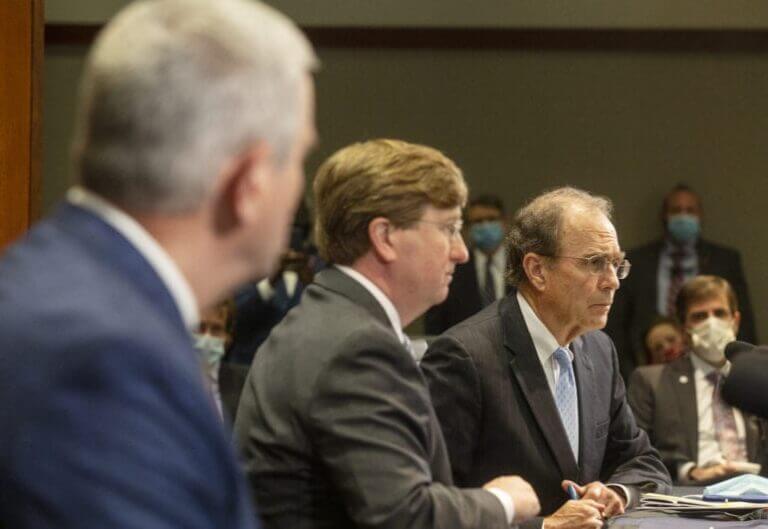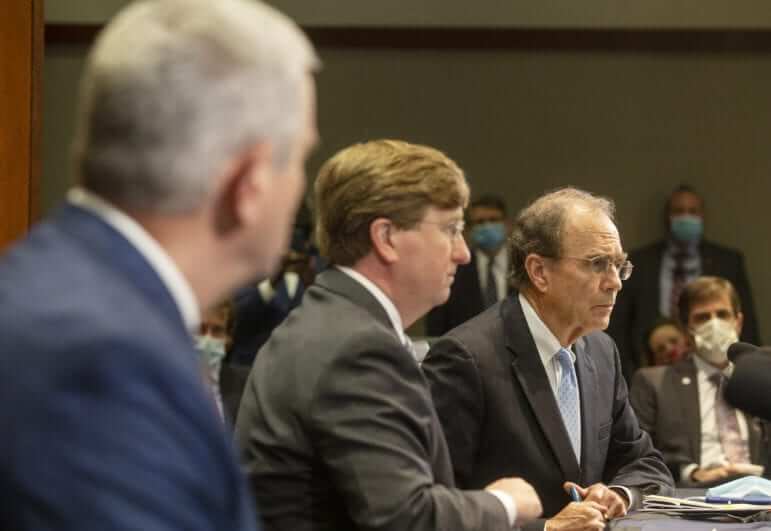

Eric J. Shelton/Mississippi Today
House Speaker Philip Gunn, left, and Gov. Tate Reeves listen as Lt. Gov. Delbert Hosemann speaks during a press conference on May 7, 2020.
What looked to be a ho-hum 2021 legislative session as a respite from the 2020 session — the longest in state history and dominated by COVID-19 — got more interesting this past week when Gov. Tate Reeves released his budget proposal.
The Republican Reeves proposed phasing out the state’s income tax, which accounts for more than 30% of state general fund revenue, or about $1.90 billion annually.
Reeves, in his first year as governor, spent most of the 2020 session being bullied by legislative leaders and reacting to their actions, such as their historic move — originally opposed by the governor — to replace the 126-year-old state flag that incorporated the Confederate battle emblem in its design.
The governor, in his budget plan, made it clear that he intends to be the hammer and not the nail in the 2021 session. And from a strategic standpoint, he might have selected a good issue on which to base that effort. After all, there is nothing from a policy standpoint a Republican politician likes better than a tax cut, and especially an income tax cut. And Republicans maintain the three-fifths majority needed in each chamber to pass a tax cut if they all stick together.
While the ongoing pandemic casts doubt on the economic outlook for the state and on the amount of revenue that will be generated to pay for vital services, Reeves argues that now is precisely the right time to enact a major tax cut.
“We as a state need to think big…” Reeves said. “What can we do to make a splash? What can we do to say to the world not only do we want you to invest capital here, we want you to move here.”
Eliminating the income tax would spur that growth, Reeves said.
House Speaker Philip Gunn, R-Clinton, has long been a proponent of cutting the income tax. A matter of fact, during the previous term, then-Lt. Gov. Reeves, as the presiding officer of the Senate, blocked efforts of the House leaders to phase out the income tax.
Gunn has advocated for the state relying on use and excise taxes to fund state government. Mississippi, the poorest state in the nation, relies on both a 7% sales tax on retail items and a relatively modest income tax to generate the bulk of the revenue to fund state government.
During the 2019 gubernatorial campaign, then Democratic Attorney General Jim Hood, who lost to Reeves, proposed reducing the 7% sales tax on groceries, which is the highest state-imposed tax of its kind in the nation and disproportionately falls on the poor to pay.
Many Democrats and some Republicans in the state have for years tried to at least reduce the tax on food.
According to the Institute for Taxation and Economic Policy, Mississippi had the nation’s 24th most regressive tax structure in 2018. Regressive taxes place more of the burden on the poor. If the income tax, a progressive tax that generally requires the wealthy to pay more, is eliminated, that could result in a larger tax burden for the poor. Reeves maintains the income tax could be phased out without needing to increase other taxes to make up for the loss in revenue. The income tax cut would result in growth of other revenue sources, he reasons.
Others argue that the needs are too many to be reducing taxes. Kindergarten through 12th grade education is underfunded more than $250 million for the current year, and most acknowledge that it will be shorted by at least that much in the coming fiscal year. Community colleges and universities also have been underfunded, and the state faces multiple challenges in providing health care to the needy.
During the 2019 campaign, both Reeves and Lt. Gov. Delbert Hosemann said providing a multi-year pay raise to get teachers to at least near the Southeastern average was a major priority — perhaps their top priority.
A pay raise that was planned for the 2020 session was scrapped because of the uncertainty caused by the pandemic. Reeves did not make a teacher pay raise part of his legislative priority released last week, though a spokesperson later said the governor believed there would be money for a pay raise even while cutting taxes.
But he notably said when presenting his budget that teachers tell him all the time, “I didn’t get into teaching for the money. I didn’t go into teaching for any other reason than I wanted to make my community a better place.”
Still, Reeves might have a difficult time convincing legislators during the 2021 session, which begins in January, to impose a massive tax cut if they cannot muster the money for a teacher pay raise.
Under that scenario, he could again become the nail.
The post Gov. Tate Reeves hopes tax cut plan makes him the hammer, not the nail in 2021 appeared first on Mississippi Today.
- Mississippi Marketplace: data center ups and downs, alcohol shortages and new manufacturing projects - February 19, 2026
- More Mississippi students are graduating despite pandemic-era disruptions, new data shows - February 19, 2026
- Education advocates says Mississippi needs honest, nuanced school choice discussion - February 19, 2026